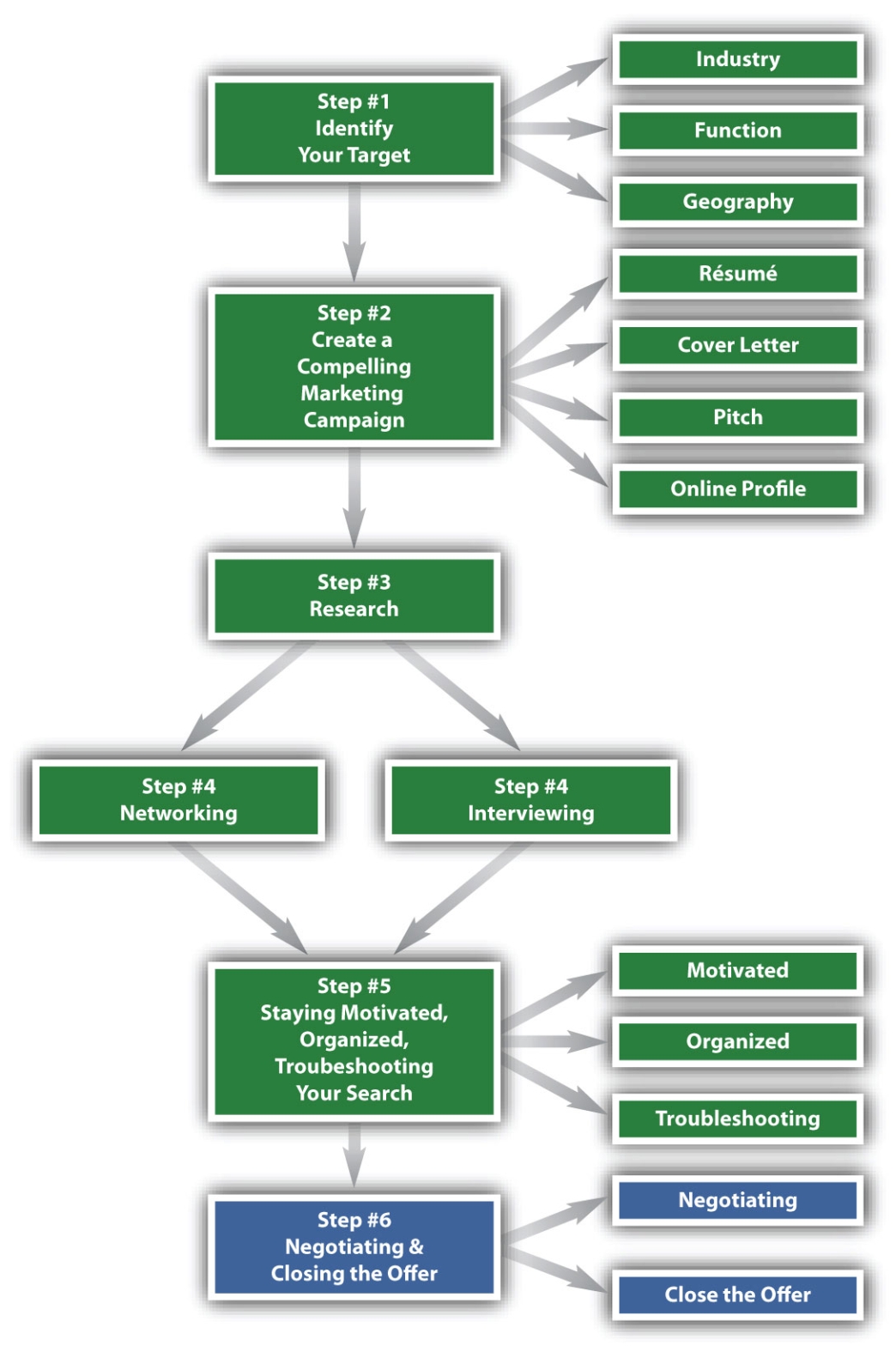Figure 10.1 The Six-Step Job Search Process: Step 6

A Quick Review of the Six Steps
By now, you have read about and studied five of the six steps in a job search and you are ready to learn about the final step: Step 6, Negotiating and Closing the Offer! This last step should be fully supported by all five that came before it:
Now you enter step 6 with quite a lot of knowledge, research, and forethought that will springboard you into the negotiation phase and allow you to successfully close the offer.
What is negotiationA dialogue between two or more people, intended to reach an understanding that will satisfy all parties.? It’s a dialogue between two or more individuals to reach a point of understanding that pleases both parties. Negotiation requires skills just like any other step in the job search, and this chapter will give you strategies to strengthen those skills.
Many people feel quite a bit of anxiety at the thought of negotiating, and that shouldn’t be the case. We negotiate for things all the time: where to have lunch or dinner, what movie to see, what channel to watch. It’s true that negotiating for a better offer is more important than where to have dinner, but some of the same tactics and strategies apply. We’ll discuss them in great detail.
We negotiate with a host of individuals, including both family and friends and business managers and colleagues. With our family and friends, we negotiate where and when to go on vacation and what movie we should see. With our business colleagues, we negotiate work schedules, promotions, job responsibilities, and of course, salary increases and bonuses. We negotiate with our managers, our colleagues, our vendors, our clients, our consultants, and our peers at other firms.
Your ability to negotiate effectively impacts your relationships and your career. Relationships, team roles, project support, and resources, in addition to project deadlines, must be discussed and agreed on by many parties.
A note about the negotiation skills of women versus men: women and men may have the same amount of education; however, there has been a workplace trend in which women get paid less than men. According to ABC.com, on average, women earn just 77 cents for every dollar a man gets.Tory Johnson, “Men vs. Women at the Bargaining Table,” Good Morning America, September 26, 2007, accessed June 3, 2011, http://abcnews.go.com/GMA/PersonalBest/story?id=3651753&page=1. One explanation for this wage discrepancy is that women don't negotiate as often as men do, and if you don’t negotiate, you don’t receive any increase. Another explanation is that men may enjoy the negotiation process, and see it as a competitive sport, whereas women tend to avoid it at all costs. The following link should be viewed by both men and women, as it shares negotiation strategies that can be used by both; however, this piece focuses on how women especially need to negotiate: http://www.sixfigurestart.com/career-coaching. Whether you are a man or a woman, the strategies outlined in this chapter will help you negotiate successfully!

What Can Be Negotiated? Most people think negotiation refers only to compensation. While compensation is certainly one of the main things you may want to consider negotiating, there are many other things to consider:
This list is lengthy, but far from exhaustive. It’s important to identify the one or two items that mean the most to you, and select those as negotiation targets. It’s also important to note that some offers will be far better than you anticipated, and you will want to accept right away. As long as you conduct your research, and know with a good amount of certainty that the offer is exactly what it should be, go ahead and accept. However, it’s strongly recommended that you wait at least one day before doing so (it’s always a good idea to run the offer by someone who is experienced in what represents a good offer and what does not). Others will choose to negotiate for one or two components of the offer they wish were better. Either way, ensure that your research clarifies whether or not your offer is within the proper compensation range.
How Do You Close the Offer? The second part of step 6 is Close the OfferMeans that once you are a final candidate, you distinguish yourself above all the others to actually be the one to receive the offer., which means that once you are a final candidate among a final slate of candidatesIdentifies you as a final candidate, among others (usually two or three)., you must distinguish yourself above all the others to receive and then close the offer. Learning the strategies in this chapter will help you to distinguish yourself and get that offer.
Step 6 is the last step in the job search, and the most important of all. Without step 6, there would be no offer, and no job. Each section of this chapter will strengthen the skills necessary to negotiate and close the offer. These strategies are followed by a question-and-answer section at the end of this chapter that should highlight options you can consider when you do get your offer. Let’s begin!
Before negotiating, research the position or the person you are negotiating with. This should let you know what he or she expects the right compensation to be. You should also know the compensation you expect. Once those two things are known to you, build a bridge so both parties connect, and try to meet at the right point.
For example, your research for a teaching position should disclose the starting salary and the requirements for that starting salary. You may have gotten this information from speaking to career services, from prior graduates entering that field, and/or via research on the web. You can discuss the salary you want using the data you’ve uncovered during your research. If starting salaries for teachers in New York are between $40,000 and $45,000, you can try asking for a salary of $45,000.
Listening is key during the actual negotiation, so use active listening techniques that include taking notes and nodding your head. Understand that adjusting to the situation and being open-minded are important versus a “one size fits all” model. Put yourself in the shoes of the person doing the hiring so you can clearly understand how he or she benefits from this negotiation. In addition, be on the lookout for unexpected opportunities that may present themselves, and be open to these. It’s a must to always be professional. Proactively seek to clarify and simplify, and always support your experience with specific examples. Making a situation a “win-win” is a great goal to shoot for.
For example, if the high end of the teacher’s salary range pertains to teachers with two to three years of student teaching experience and you do not have any, it is understandable that $40,000 may be the right compensation for your starting salary. Perhaps a position in this city has a starting salary of $40,000, but another nearby city might have a starting salary of $45,000. If you are open to this different location, this could benefit you quite a bit! Even if things are not working out and it’s clear that you cannot come to a mutually beneficial point, always remain professional and thank the person for his or her time. If you make a good impression and a position becomes available the following week or month, perhaps you will be called back. The benefits to being courteous and professional are huge.
After a negotiation, it is very helpful to clarify things in writing and confirm a new timetable as soon as possible. Assess what took place during the negotiation so you can learn from your experience and strengthen your negotiation skills for the next time.
For example, perhaps nothing worked out at this particular time. Keep in touch with this person, as positions may open up the next month, the next quarter, or perhaps even the next year. Perhaps you accepted the lower starting salary of $40,000. Send the interviewer a thank you and let him or her know you are excited. That positive, professional impression will go a long way toward future negotiations and perhaps promotions.
Many individuals are highly uncomfortable when the subject of salary or compensation arises. Why? Because money evokes emotion in a lot of people and whenever emotion is involved, rational thought tends to wane.
Money, to a large extent, dictates your style of living. If you are reading this book as a college student, the starting salary you receive may determine whether you will have to move back home with your parent(s), if that is even an option, or if you will have an apartment with one or more roommates. People get emotional about lifestyle issues.
To decrease the stress related to your living expenses (whether you move back home or have a place of your own), know your expenses, including rent, utilities, food, transportation, clothes, gifts, credit card debt, student loans, and so forth. If you’ve done your research, will the position for which you are aiming cover these expenses? Is there a match? Is there a huge disconnect? It’s best to review your expenses and think about them sooner rather than later.
We need to make rational decisions, so we need to remove the emotional component from the negotiation process, and it’s very possible to do so. If you have followed each of the steps in the job search process, you should have more confidence in the process. You should have a plethoraA wide variety and a large amount. of job search activity, no matter what the state of the economy, that should result in multiple offers. Knowing that you will have multiple offers should calm you, even if you are the most nervous or emotional individual.
Practice is a theme that has been present in every chapter of this book, and negotiation is no different. Meet with career services to practice negotiating until you feel very comfortable. After role-playing three or four or five times, your emotion should be kept in check and shouldn’t interfere with the conversation. You may also practice with a friend, but try to get as much advice from a professional as you can.
Remember to conduct in-depth research to ensure you have a clear idea of what the salary levels should be. There should be no surprises at this stage if you’ve conducted the proper research, which includes speaking to career services, speaking to your network of peers, and conducting various salary surveys. A good source of starting salaries can be researched on the National Association of Colleges and Employers (NACE) website. NACE also has a Salary Calculator tool that enables you to enter the state in which you reside, the region, and the appropriate occupational categories (ranging from business to life, physical, and social sciences, to the arts, health care, sales, forestry, construction, installation and repair occupations, to transportation and material-moving occupations).
Another tool you may decide to use is GetRaised (http://www.getraised.com), which helps determine if you are being paid the right amount relative to the job you are doing. For college students seeking entry-level jobs, you can still use this tool by entering “one year” in the number of years you’ve been working in this particular job, and then enter all the other information asked (where you work, the title of the job for which you are applying, and so forth). This tool will give you the competitive salary for this position. Of course, you will have zero experience, versus one year, but at least it gives you an idea of the salary range you should be seeking. It’s a very useful tool for experienced job seekers, especially because it will give you the script you can use to negotiate for higher compensation. GetRaised is just one tool of many, so research various tools available to you.
It’s important to review the various components of an offer before accepting. When identifying what to negotiate, several individuals may think only to negotiate base salary, or total compensationRefers to all facets of compensation: base salary + bonus + commission (if applicable)..
Cash and noncash components can be negotiated, and each has a host of considerations:

Bonus. Several bonusPertains to an amount of money, in addition to your salary, based on performance. options could be available, depending on the company and opportunity. If you are not eligible for a bonus, ask if it would be possible to receive one in the future, if your performance goes above and beyond what is expected. Ensure you know the timing of each bonus that could be available to you.

Company stock. Sometimes, companies pay only the more senior individuals company stock or company equity. If company stock is made available to you, know the guidelines.
Benefits. Companies offer various benefits, and it’s important to review these carefully when considering an offer. Some plans allow you to take your benefits elsewhere (this is portability, and there is a fee, but it does provide flexibility). Often, these plans can be a bit confusing; many companies offer hotlines to call for further explanation. Benefits offerings can include the following:
There are many reasons noncash items can prove to be important and sometimes critical in the acceptance of a job offer. Perhaps you have a medical condition that requires specialized treatment or medication, so medical benefits are extremely important. Perhaps you have a vacation booked in advance and you wish to push the start date off a bit to enjoy this long-planned trip with family and friends. Perhaps a lower base salary makes sense when combined with bonus potential, stock options, or grants. A higher base salary may make more sense because it’s a given, whereas bonuses and stocks are influenced heavily by economic downturns. These are important reasons to consider all elements of a job offer before accepting.
Many individuals shudder to think of negotiating, in any type of economy, never mind a down economy. That should not be the case, especially when you consider all the work the company has to do before they identify you, the perfect person to receive the job offer.
All the steps a larger company may take to fill an opening are included in the following list. Smaller companies may require fewer steps, but the detail listed here demonstrates the great amount of time and effort needed to find the right person to extend an offer. Once that person is identified, employers do not want to start the process over again, so there is some room for negotiation.
Steps include:
The preceding exercise demonstrates that once a company extends an offer to you, they want you to accept. If you would like a bit more in your salary, most companies will consider complying to ensure you accept, but some will not. If you would like a bit more in terms of year-end bonus percentage targets, they may easily decide to comply, but then again, they may not. If you are interested in a later start date, they may be open to that, and of course, some may not be.
It’s important to also remember that nothing is a given. In strong hiring markets, your chances are stronger to negotiate. But even in down markets, you still have leverage.
Also note that your base salary is a very important starting point at a company. Accepting an offer with a compensation level that is far below market value can be a tricky move as well, even if you are very anxious to get any experience you can. Your next employer may be very curious as to why your compensation level is so low, and it could add a red flag to your candidacy. Whenever in doubt, speak to a professional—perhaps someone in career services or a colleague in the field. For most opportunities, salary increases come just once a year and are sometimes skipped in down economies, so you could be “stuck” at a very low compensation range for a longer time than you would like. Getting a higher base when you begin can make a significant difference for many years to come. With that said, research is always a key point in the negotiation phase. Ensure you know the best starting point, and your negotiation will be more successful. Also note that if you are hired into a large company, with a formalized entry-level program, all hires receive the same exact compensation package, and there is no room for negotiation. You can still ask, but the answer may be no.

Step 1 of the job search emphasized that an individual should shoot for at least ten targets during a job search. Your goal is to receive as many offers as possible. Offers equal negotiation power. If you plan your job search strategy properly, many of your targets will move toward step 6.
As you move toward an offer with one company, it’s important to communicate with the others as to when you expect to receive an offer. To be fair, give each company the needed lead time to prepare an offer.
Peter interviews with Company A, which is his number one company. If he receives an offer, he will readily accept. Company A has interviewed Peter twice, and he is a finalist. They are not ready to extend offers until next month, but they ask that Peter let them know if he receives an offer from another company.
Peter has interviewed with Company B and he is put on hold.
Peter then interviews with Company C just hoping to get an offer, so he can leverage that with Company A. Things go very well and he is more interested than he thought. If given an offer, he would seriously consider accepting. Company C lets Peter know he will receive a call regarding his candidacy on Friday and that they feel very positive about what he has to offer. They do not, however, tell him that he will definitely receive an offer.
Peter has interviews with Company D, E, and F in the next ten days.
Peter calls Company A and sends the following e-mail:

This e-mail communicates six very important things:
Donna wants to teach in an elementary school and has been networking and meeting several principals. Two of them have interviewed her and have expressed interest in her teaching at their school.
Donna really wants to work at P.S. 55 and has received an offer as a teaching assistant. Luckily, Donna was also offered a position at P.S. 22 for a full-time teaching position, but she would much rather work at P.S. 55. She can negotiate with the principal at P.S. 55 in the following way:
When you have multiple searches occurring at the same time, stay organized by having a playbookA short concise reference document that helps to direct an effort. of sorts, as illustrated in Table 10.1 "Job Search Plan".
Table 10.1 Job Search Plan
| Company Name | Name of Contact | E-mail and Phone | Position of Interest | How You Found Out about the Position | Actions Taken | Deadlines | Next Steps | |
|---|---|---|---|---|---|---|---|---|
| 1 | ||||||||
| 2 | ||||||||
| 3 | ||||||||
| 4 | ||||||||
| 5 | ||||||||
| 6 | ||||||||
| 7 | ||||||||
| 8 | ||||||||
| 9 | ||||||||
| 10 |
This single page in your playbook will keep all high-level information and each subsequent page can keep more detailed information. Reviewing this playbook on a regular basis ensures that you stay proactive on every job search target. It also reminds you that you should have ten targets at any given time, because some job targets are bound to go cold.
The best candidates communicate consistently with recruiters, hiring managers, and networking contacts. If you’ve met three or four helpful networking contacts, and for some reason you did not make it to the final round, communicate with them as well, thanking them for the information they shared with you, even though your candidacy will not continue. Ask them if it’s OK that you continue to keep in touch, and wish them well with their careers. Individuals do shift positions and companies, and the world can be an amazingly small place. It’s quite possible that you will meet that person at another time, company, school, or organization, so include them in your LinkedIn contacts.
Poor communication can lead to poor decisions. If Donna didn’t explore full-time teaching opportunities at P.S. 55, she could have missed a full-time teaching position that opened up the next month. If Peter never sent the e-mail to Company A, and Company C gave Peter an offer with three days to accept, Company A may not have had the time to put together an offer by the deadline date set by Company C. Peter would have either gone with Company C (his second choice), or reneged on his acceptance to Company C by accepting the offer that finally came from Company A. Reneging is viewed negatively by some recruiters and by career services, so proceed with caution. At times, an employer will contact a student’s career services office to let them know that their offer was reneged on. Some career services offices deal harshly with students who breach such promises, so proceed with caution. Records of how many students renegeMeans that you first accept a job and then decide to later turn it down for another opportunity. on their offers aren’t kept, but one thing is certain: it’s never looked upon lightly. Communication with career services can help to avoid this at all costs.
One last point: never misrepresent an offer from a company to a representative at another company. The truth does have a way of making itself known.
In the previous section, good communications skills were highlighted as a way to effectively negotiate an offer with two prospective employers. In addition to good communication skills, you can employ other strategies.
When negotiating for increased salary, it’s imperative to make the business case for why your skill set deserves the pay you request. Share market data that shows how much people with this skill earn (your research from step 3 will give you this information). Show how the skill will add to the company’s bottom line (your assessment of your strengths from step 2 and your interview skills from step 4 will enable you to do this). If you lack years of experience, focus on what you can do from here on and keep the discussion centered on the skill as opposed to experience to maximize your negotiations.
Kevin is a master’s level chemical engineering major. He received the offer he wanted: to work on a government base, focused on a fascinating project for which he was perfectly suited. He received an offer for $53,000.
Kevin was disappointed and thought he should have received $65,000. When he asked his career coach how to raise the offer to $65,000, the coach asked where he came up with the $65,000 figure. Kevin didn’t have anything to substantiate the figure, other than to say he thought it was an equitable amount given his advanced degree and his 3.8 GPA.
Kevin was instructed to conduct research as to what a chemical engineer, with a master’s degree would be able to get in the market. He checked with his career services office, and he was told $60,000 was the going rate. He did a Google search regarding what a chemical engineer in New York City was apt to get and $60,000 came up again. He then spoke to a peer at his college who was working for a similar company, doing a similar job, and she was paid $60,000.
Kevin was now confident that $60,000 was the number to reach. He wanted to contact his employer to discuss this, but practiced with his career coach in advance. Once he was comfortable with how to present his case, he made the call:
Kevin: Hello Mr. Duffy, it’s good to talk with you again. I wanted to thank you again for the offer you gave me for this position. This is exactly the type of work I was hoping to do once I graduated and I’m very excited to begin.
Mr. Duffy: I’m glad to hear it. I’m very excited to have you join the team, and I’m hoping you are calling to accept.
Kevin: I do want to accept and I want to be excited about the position. I’ve done a bit of research and found that my skills, in today’s market, call for a base salary of $60,000 versus the $53,000 offer I received from you. This was supported by my college’s career services office, by a salary survey of chemical engineers conducted just two months ago, and by my peers at my university. Is there any way I can get the offer raised to $60,000?
Mr. Duffy: Unfortunately Kevin, my hands are tied. I have a budget that allows for $53,000 and I cannot move from that point. In six months, however, I am able to give you a performance increase, should things go well, and there is a possibility that I can raise your salary by $10,000. In addition, we offer you the opportunity to get your PhD, on premises, and at no cost to you. I hope that is of interest to you.
Kevin: It absolutely is. I have great confidence that my performance will be very strong and that I will be able to contribute quickly and significantly. I do have great interest in obtaining my PhD. I thank you for discussing this with me and I would like to formally accept the offer. Will you be sending me an offer letter?
Mr. Duffy: I’m so pleased. Yes, your offer letter will be sent out tomorrow and I look forward to receiving the signed copy back from you. I am anxious to have you join our team!
Kevin: I am as well. Thanks very much!
This phone exchange communicates five very important things:
Market your skills, especially if you have unique abilities. For example, if you speak more than one language, that can be seen as a benefit to an employer, especially when dealing with customers. Think about how that differentiates you and market that skill in terms of how it benefits your future employer.
Highlight how your background strengthens your candidacy. If you’ve had internships and part-time jobs that added to your skill set and will ensure that you contribute readily to an employer from day one, make sure you discuss that information with them. The key to impressing a potential employer is to make the case why your skills outmatch your competition by showing them why and how—even if you have to volunteer your time.
Demonstrate how your skills can benefit your employer now. If you’ve completed work via an internship or a previous job that has direct usefulness to your future employer, share it with them (as long as you don’t share confidential data). Demonstrate that you can do the job right now, and that you have familiarity with the process. That could nudge you ahead of your competition.
Always negotiate professionally, and always be prepared to hear no. This way, you are encouraged by what you can achieve through the negotiation process. Never engage in aggressive negotiating behavior because it can backfire and cause you to lose the offer completely.
Use your references. You were advised to gather recommendations in advance of your interviewing activity. Sharing testimonials of a job well done can only support your candidacy in a very positive way.
Remember the famous phrase, “It’s business, it’s not personal.” It can be difficult to separate business and emotions; however, highlight your accomplishments by their business impact, including costs saved, revenue generated, and profits increased. Be very clear about how your contribution leads to bottom-line impact.
Good negotiating is a valuable skill you will always use in your career, so strengthen this skill sooner rather than later!
Whenever you apply for a position, you should have the six attributes described in this section at your disposal, at every stage: when you apply, when you are contacted to interview, and most of all, as you continue in the interview process. You should use these attributes most of all when you are a candidate on the final interview slate because you need to continue to distinguish yourself among other candidates.
The process can be grueling, demanding, and downright difficult. If you are a student going through the on-campus or off-campus interview process, you have to balance your job search activities with exams and perhaps even finals. If you have a part-time job or even a full-time job while going to school, you have even more things to juggle. If you are searching for a job after you have graduated, or if you’ve been out of school for several years, there are always things in your life that command your attention. You need to master keeping these attributes “at the ready” because your life’s chaos should never been seen or even sensed by your future employer.
Let’s review why each of these six attributes is important and vital in the job search:

Determination to succeed. You will absolutely need a determination to succeed because you might face pitfalls, curves, and roadblocks at every stage of the search. Viewing this process as long term can be very helpful in ultimately getting a job offer:
Often, listening to questions and answers about a topic brings it to life. The following Q&A came from real job search candidates trying to solve issues they faced in their job search. The questions are written in the present tense and will include phrases such as, “I did this” or “I’m not sure what to do here.” Read on and learn about how to manage these situations should they arise in your job search five days from now or five years from now!

Question 1. I am planning to accept a job that pays below market because everything else about it is ideal. The job responsibilities are exactly what I want to do. The structure of the organization is ideal and my boss and team seem great. I also expect to move in two to three years anyway. How much impact will the lower salary have on my future negotiations?
Answer. You should be commended for considering factors other than just salary in your job decision. At the same time, salary history carries a lot of weight in future salary negotiations, so the decision to take a lower salary now will require extra work in the future:
Question 2. Is there ever a scenario where taking the lower salary makes sense?
Answer. Of course, there is. Career planning is a highly individualized process, so exceptions abound. However, rather than encourage you to accept a lower salary, I challenge you (women especially!) to explore as many other creative solutions as possible to get what you want without having to “pay for it” in a lower salary.
Question 3. What’s the best way to approach a recruiter about salary negotiation? How does someone new to the workforce approach negotiation? How does that approach change after you have a few years of experience?
Answer. Recruiters will demand to know salary before they present you to the client. They need to know that you are in the ballpark of what their client is expecting. It also is good market knowledge for them to have. So you need to know that whatever you say goes to their client.
When you are new, you might think you have no negotiating leverage. It is true that the big management training programs or analyst and associate programs at banks and consulting firms have set salaries with little negotiating. For everywhere else, and that means most other jobs, there is no standard salary. You are paid what the employer has in their budget and what they think you are worth. Look at the market value of your skills (computer, languages, analytical, coursework), your internships and part-time jobs, and your degrees. Know what benefit you will bring to your employer’s bottom line and what comparable people in these same roles are making. When you are new, employers will try to pay you based on your years of full-time experience because you have relatively little. You want them to focus on skills and results.
When you are experienced, it’s trickier because there are more variables, but the essential lessons remain the same. Know your market and how you contribute. That is your value and that should be your price.
Question 4. Due to the down economy, I committed to a job offer that paid very little (peanuts), but was offered a good job profile. As time progressed, I realized that the company did not deliver on its promises and I plan to quit soon. As I apply for jobs, I am expected to quote a salary based on my current salary. The current salary is very little and I believe that with my experience and education I should be able to quote a higher salary. How can one deal with this situation?
Answer. Your current salary is a very strong anchor to what employers think they need to pay you. Therefore, you need to do whatever you can to establish your value before divulging how little you make. Focus on what you are bringing to the job and what comparable people in these roles are making. See the points in the preceding answer. Now that you have established that this is the correct anchor, you can explain your salary as an anomaly and one of the reasons you are leaving. Employers are happy to get good hires at a fair price, even if that means paying a lot more than what you happened to make at a previous job.
Question 5. How do I respond when a job posting (application) asks for salary history and minimum salary requirement?
Answer. This is why I don’t recommend that people spend a lot of time responding to job postings. There is very little room to maneuver because some employers toss out applications with missing information, such as salary and salary requirements. I won’t even move ahead with presenting candidates to my clients and hiring managers without salary information. You have to respond with the truth, and, unfortunately, the salary you name anchors how the employer perceives you.
If you don’t want to respond, you need to find another way to apply that circumvents the application. Network into the decision makers and bypass the recruiter. Make a pitch that focuses on your value so that salary becomes a secondary consideration.
Question 6. I received an offer from a large consulting firm. The start date for the job is July fifth. My family always spends the July fourth holiday and the remaining week at my grandparent’s cottage in Lake George. This consulting firm has a training program that begins on July fifth. I’d like to begin on July eleventh. Can I negotiate for this?
Answer. Large firms put extensive time and effort into constructing training programs that can introduce you to the company, along with senior managers, and provide training that can be vital to your success.
Speak to your human resources contact and ask what is on the schedule for the first week of training. The training can be eight weeks long, with the first week scheduled with senior manager welcomes. If they feel this is something that can be missed, then you have an option to consider.
I would recommend you skip the family vacation this year, and get a good start to your career. Important networking contacts can be made in that first week when everyone is new to the company, and those contacts last decades. The information you can gather at this training event can be vital to your success.
Question 7. I have two years of administrative experience with a medium-sized manufacturing firm and I’m making $45,000. I finally got an interview for a job I’ve wanted as a compensation analyst. The recruiter said I would be offered the job for $45,000 because I don’t have any experience, but they really like me. I wanted $55,000. Should I hold out for that?
Answer. You need to do your research. What are entry-level compensation analysts getting in your market—Los Angeles? Let’s say your research gives you two data points that indicate the going rate is $50,000. You can then negotiate for the $50,000, citing the research, and citing that you have two years of business experience under your belt. In my twenty-five years of corporate experience, I’ve never seen an offer pulled because a candidate asked for an additional $5,000. Think ahead: is there anything else worth negotiating for? Either way, it may be worth taking for three reasons: (1) it’s a step up from administrative assistant, (2) you will be learning a new skill that is of great interest to you, and (3) you can grow within that discipline.
Individuals can naturally get intimidated when they have to negotiate, but the truth is that we negotiate things every day, without even realizing it. We negotiate which restaurant to go to, which movie to see, how to best present a project, yet no one feels intimidated or nervous about negotiating.
It’s a given that negotiating for a job has more serious implications that negotiating for what movie to see, but if you’ve done your prep work, it should go very smoothly.
Negotiation is a skill and, like any other skill, practice is critical to succeeding. Role-play with your friends and your contacts at career services. Practice asking for a slightly higher salary with a partner who doesn’t give in easily. Practice asking for a higher salary with a partner who doesn’t give in at all. Respond professionally and appropriately at all times.
When receiving an offer, it’s best to think of the totality of the offer. What makes you happy about the offer? What displeases you and how would you like to see it changed? In some cases, you will not be pleased in the compensation arena because you’ll have less vacation time than you would like or no opportunity for a bonus (at the starting point). Either way, remain professional at all times, and balance and weigh each component, thinking about the long-term potential of the position, the company, and the industry.
Sometimes when you negotiate, hiring managers will go higher with compensation and sometimes they will not. If the compensation is extremely low, much lower than the average, perhaps you should refuse this offer. Consult someone who knows what they are doing: career services, a professional you can trust, or perhaps a career coach. It’s well worth your effort to ensure you move ahead wisely and appropriately.
Some people view compensation as the most important component of an offer, and others, perhaps most, place it in the top three or four components. Other components may include the following:
Interview and get multiple job offers and negotiation will be much less stressful.
One final note: don’t forget to follow your gut instincts. We often immediately know whether something is a good or bad idea, and we are usually right. Negotiating can be risky, but you can mitigate that risk by using all of the previous job search steps, and also tuning into and trusting your instincts.